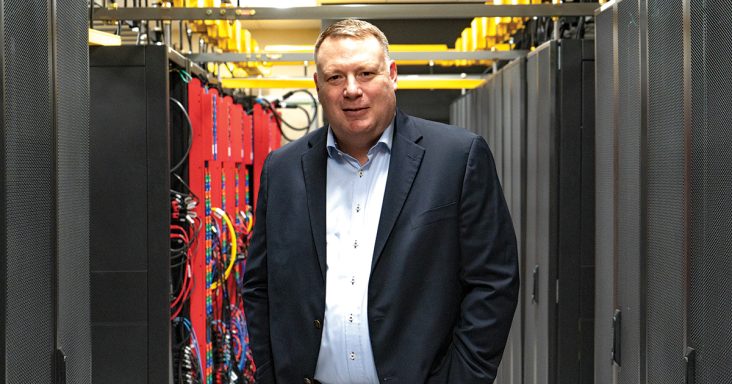Diamond State Networks working to build statewide fiber network
by February 21, 2023 4:17 pm 1,574 views

Steve Bandy, general manager of OzarksGo, stands in the data center at the OzarksGo headquarters in Fayetteville.
OzarksGo, a fiber-optic telecommunications subsidiary of Fayetteville-based Ozarks Electric Cooperative, has completed construction within its footprint and recently reached 35,000 customers. OzarksGo was the first Arkansas cooperative-owned company to offer fiber internet.
Since OzarksGo connected its first customer in 2017 in west Springdale, other Arkansas electric cooperatives have started fiber projects to improve connectivity throughout the state. In 2020, a group of Arkansas electric cooperatives, including OzarksGo, formed Diamond State Networks to bring fiber internet to more than 1.5 million Arkansans.
CEO Doug Maglothin said the Jonesboro-based company owned by the electric cooperatives is between 40% and 50% completed with the almost $1.8 billion statewide project.
The work is underway in 72 of the 75 Arkansas counties and is further along in some counties. The existing project comprises more than 50,000 miles of fiber and coverage to 64% of the state.
“There’s not a region of the state where we’re not aggressively laying out the network,” he said. “It’s all over the place.”
The cooperatives that comprise Diamond State Networks are serving more than 120,000 broadband customers. When the project is completed, they’re expected to have more than 400,000 customers, said Maglothin, noting that the state recently announced its intent to award about $110 million to the electric cooperatives to improve connectivity.
He expects the statewide project to be completed by late 2025 or early 2026. But depending on the funding available, the scope of work could rise, pushing the completion into 2027 or 2028. With additional funding, he could see the fiber network expand to cover between 70% and 75% of the state.
He said the company is pursuing federal grants and looking to partner with the state. He noted the state might receive money from the $42.45 billion Broadband Equity, Access and Deployment (BEAD) Program. The Bipartisan Infrastructure Law established the program and will provide $65 billion to expand high-speed internet service.

“There is an immense consumer demand for better broadband services in Arkansas,” said Maglothin, noting that BroadbandNow ranked Arkansas No. 49 among states with the best connectivity. “There are a few critical areas in Arkansas: All along the Mississippi Delta is very poorly served. Extreme northern and extreme southern Arkansas are both very poorly served. And the far western corridor of Arkansas has historically been very poorly served.”
‘MIDDLE-MILE NETWORK’
Maglothin explained that Diamond State Networks is the middle-mile provider for broadband services.
“A middle-mile network is more or less the source for internet when you’re an internet service provider,” he said. “Any company that provides internet to customers has to buy that internet connection from somewhere. What drove Diamond State as a project was the fact that lots and lots of broadband providers in Arkansas have very few options for buying internet connectivity.”
Diamond State Networks comprises 13 members, including 12 electricity distribution cooperatives and Arkansas Electric Cooperative, the generation and transmission cooperative that provides electricity to the distribution cooperatives.
“They’re kind of the backbone of our power infrastructure,” he said. “You can think about Diamond State as similar to Arkansas Electric; however, we’re kind of the backbone for broadband, not power.”
Maglothin said the electric cooperatives, which provide rural customers with electricity, can more easily add the internet as the “next utility service for our customers” because of their existing infrastructure, including utility poles, lights and rights-of-way.
“The wonderful thing about electric cooperatives is, in most cases, they are starting with areas that are the most in need of broadband,” he said. “In the for-profit world, you tend to start with the highest concentration of people where you can get the most revenue for the least investment. The electric cooperatives really are not a profit-centric group of investors. They are a needs-centric group of investors that are seeking to serve the least-served members first and work their way back toward their entire membership.”
The plan is to provide broadband for electric cooperatives before expanding service later this year to municipal broadband providers, telephone and cable companies, and other providers throughout Arkansas. He said the high capacity and speeds of the network would allow the service to be offered to the entire broadband industry, not only the electric cooperatives.
“We want to be the Walmart of broadband,” Maglothin joked. “We want the best broadband supply chain and the lowest cost.”
He said that before Diamond State Networks was established, some cooperatives paid more than $1 per megabit for upstream connectivity to the internet. As a result, a 10-gigabit connection cost $10,000 per month, and they typically need two or three connections to allow for redundancy. He said that Diamond State Networks aims to reduce costs by over 90% to 10 cents per megabit or less. As the company adds customers, it will allow for lower-cost internet.
HIGH SPEED, CAPACITY
Diamond State Networks can provide internet service providers with speeds of up to 800 gigabits per second. Its total network capacity is about 34 terabits. The network also offers redundancy, so a fiber cut wouldn’t be as impactful.
“It can easily be upgraded to carry much more capacity than that,” Maglothin said. “But in total, it’s going to be the largest, fastest and most high-capacity network in the state of Arkansas.
“We took on a very ambitious plan because historically it has felt like Arkansas has almost always underinvested in its infrastructure for internet,” he added. “That’s one of the main reasons we’re always at the bottom of the list for most connected states. In taking on this highly ambitious technology and this capacity that we feel will last years and years, we feel like our mission of making Arkansas the most connected state comes into focus.
“When we wrote our mission statement about making Arkansas the most connected state in the country in 2020, I think we all probably unanimously thought it was a little bit crazy to even think about,” he joked. “But what’s been amazing is the last three years and the progress we’ve made and the interest we’ve seen from all parts of the state tell us that mission was not only not crazy, but it’s going to be very achievable, probably in the next few years.”
Asked about expansion plans in Northwest Arkansas, Maglothin noted the broadband need in the extreme northwestern part of the region and that it looks to expand the network to serve residents better there.
He added that the project likely wouldn’t expand into the cities of metro areas that are already served by multiple broadband providers, such as Little Rock, Fort Smith, Jonesboro and Fayetteville. However, Diamond State Networks could partner with cities and areas without a fiber network.
“We sort of look at fiber as the next 50 years of internet service,” he said. “I think a lot of the old copper element networks will expire sooner than people probably imagine.”
The company also is collaborating with cooperatives in other states, including Alabama, Michigan, Mississippi and Oklahoma, to roll out networks similar to what it’s building in Arkansas. He noted that creating regional or national cooperative-owned, middle-mile networks can help when negotiating for internet service. He added that owning internet hubs instead of leasing services from large companies would help to drive down costs.
Diamond State Networks has 12 employees, uses nearly a dozen subcontractors and has access to area cooperative employees. He expects to have about 30 employees by the end of the year.
CONSTRUCTION COMPLETED
In late December, OzarksGo announced completing construction in the Ozarks Electric footprint and having 35,000 subscribers.
“It’s a huge accomplishment of all the employees pulling together and getting this completed,” said Steve Bandy, general manager of OzarksGo. “If you look at the 80-plus year history of the cooperative of Ozarks Electric and being able to build over every mile of our territory in five short years, that’s pretty significant.”
Along with 1-gigabit fiber internet, OzarksGo also offers TV and phone services to its customers in Northwest Arkansas and northeast Oklahoma.
In 2023, the company plans to expand outside the Ozarks Electric footprint and upgrade its electronics to offer multi-gigabit services for residential customers. Bandy noted that it would provide customers, especially rural ones, with speeds better than in many urban areas.
He’s read that the norm will be 1-gigabit speeds by 2025, and OzarksGo looks to stay ahead of that. He added that offering multi-gigabit speeds will allow the company to have the capacity to prepare for the future so customers can meet connectivity needs.
Bandy said OzarksGo currently acquires internet from providers in the Dallas and Kansas City metro areas. He said middle-mile provider Diamond State Networks acts as a bridge connecting the cooperatives and other providers to allow connectivity outside the state.
Also, he said peering allows for content sharing, such as movies, within its data center. As more content comes into the state, he said more providers would want to access it, and this provides revenue for the state. Once Diamond State Networks is completed, peering could become available in other metro areas, such as Atlanta. The network also will provide for better redundancy for the state. He noted that OzarksGo already has network redundancy.
OzarksGo has 77 employees, up from three in 2016. Bandy said he hopes to reach 40,000 customers in about a year.
